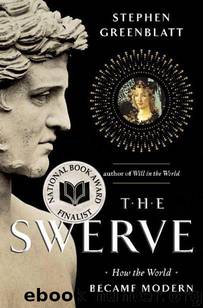The Swerve: How the World Became Modern by Stephen Greenblatt

Author:Stephen Greenblatt
Language: eng
Format: mobi, epub, azw3
ISBN: 9780393064476
Publisher: W. W. Norton & Company
Published: 2011-10-15T18:39:33+00:00
lies on the ground naked, speechless, and utterly helpless as soon as nature has cast it forth with pangs of labor from its mother’s womb into the shores of light. (5.223–25)
The fate of the entire species (let alone that of any individual) is not the pole around which everything revolves. Indeed, there is no reason to believe that human beings as a species will last forever. On the contrary, it is clear that, over the infinite expanses of time, some species grow, others disappear, generated and destroyed in the ceaseless process of change. There were other forms of life before us, which no longer exist; there will be other forms of life after us, when our kind has vanished.
• Humans are not unique. They are part of a much larger material process that links them not only to all other life forms but to inorganic matter as well. The invisible particles out of which living things, including humans, are composed are not sentient nor do they come from some mysterious source. We are made of the same stuff that everything else is made of.
Humans do not occupy the privileged place in existence they imagine for themselves: though they often fail to recognize the fact, they share many of their most cherished qualities with other animals. To be sure, each individual is unique, but, thanks to the abundance of matter, the same is true of virtually all creatures: how else do we imagine that a calf recognizes its dam or the cow her calf? We have only to look attentively at the world around us to grasp that many of the most intense and poignant experiences of our lives are not exclusive to our species.
• Human society began not in a Golden Age of tranquility and plenty, but in a primitive battle for survival. There was no original paradisal time of plenty, as some have dreamed, in which happy, peaceful men and women, living in security and leisure, enjoyed the fruits of nature’s abundance. Early humans, lacking fire, agriculture, and other means to soften a brutally hard existence, struggled to eat and to avoid being eaten.
There may always have been some rudimentary capacity for social cooperation in the interest of survival, but the ability to form bonds and to live in communities governed by settled customs developed slowly. At first there was only random mating—either from mutual desire or from barter or rape—and the hunting and gathering of food. Mortality rates were extremely high, though not, Lucretius noted wryly, as high as they currently are, inflated by warfare, shipwreck, and overeating.
The idea that language was somehow given to humans, as a miraculous invention, is absurd. Instead, Lucretius wrote, humans, who like other animals used inarticulate cries and gestures in various situations, slowly arrived at shared sounds to designate the same things. So too, long before they were able to join together to sing melodious songs, humans imitated the warbling of birds and the sweet sound of a gentle breeze in the reeds and so gradually developed a capacity to make music.
Download
The Swerve: How the World Became Modern by Stephen Greenblatt.epub
The Swerve: How the World Became Modern by Stephen Greenblatt.azw3
This site does not store any files on its server. We only index and link to content provided by other sites. Please contact the content providers to delete copyright contents if any and email us, we'll remove relevant links or contents immediately.
| Africa | Americas |
| Arctic & Antarctica | Asia |
| Australia & Oceania | Europe |
| Middle East | Russia |
| United States | World |
| Ancient Civilizations | Military |
| Historical Study & Educational Resources |
Room 212 by Kate Stewart(5120)
The Crown by Robert Lacey(4814)
Endurance: Shackleton's Incredible Voyage by Alfred Lansing(4782)
The Iron Duke by The Iron Duke(4354)
The Rape of Nanking by Iris Chang(4213)
Joan of Arc by Mary Gordon(4110)
Killing England by Bill O'Reilly(4001)
Say Nothing by Patrick Radden Keefe(3985)
I'll Give You the Sun by Jandy Nelson(3447)
Shadow of Night by Deborah Harkness(3368)
Hitler's Monsters by Eric Kurlander(3342)
Mary, Queen of Scots, and the Murder of Lord Darnley by Alison Weir(3210)
Blood and Sand by Alex Von Tunzelmann(3203)
Eleanor & Park by Rainbow Rowell(3173)
Darkest Hour by Anthony McCarten(3133)
Margaret Thatcher: The Autobiography by Thatcher Margaret(3082)
Book of Life by Deborah Harkness(2939)
Red Famine: Stalin's War on Ukraine by Anne Applebaum(2934)
The One Memory of Flora Banks by Emily Barr(2863)
